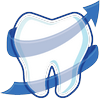 The two main dental ‘diseases’ are caries (decay) and gum disease. So what is preventive dentistry? It is doing all that can be done from a dental point of view to try to keep a healthy mouth and prevent the need for fillings/ further fillings and gum disease/ inflammation, and ultimately trying to keep one’s teeth for life.
The two main dental ‘diseases’ are caries (decay) and gum disease. So what is preventive dentistry? It is doing all that can be done from a dental point of view to try to keep a healthy mouth and prevent the need for fillings/ further fillings and gum disease/ inflammation, and ultimately trying to keep one’s teeth for life.
It should start with educating the patient about maintaining very good oral hygiene, using the right toothpaste/ toothbrush, the use of fissure sealants and fluoride mouthwashes/ tablets/ drops, the use of soft/ hard splints in patients who grind their teeth, and the use of mouthguards to prevent injuries in sports.
At your dental assessment, the dentist will check all fillings and dental restorations, and a thorough cleaning ( scale and polish) is carried out. The hygienist will show you how to brush your teeth properly to remove as much plaque as possible, and the best toothbrush to use to suit your mouth, including if necessary the use of dental aids such as interdental brushes and floss. One very important aspect of preventive dentistry is diet, that is what you eat and when you eat it. Basically, cutting down on sugary foods and eating them less frequently throughout the day will go a long way to prevent dental caries. Snacking on nuts, cheeses and fruit is ideal.
Fluoride in different forms produces a protective coating over the teeth and makes them more resistant to decay. The same is said of fluoride sealants placed on the biting surfaces of childrens teeth thus causing less plaque to stick on the surfaces and hence less chance of decay.
So basically the most important things to remember are:
- Diet
- Regular brushing of teeth at home with a fluoride toothpaste (Don’t rush! You need time to brush properly)
- Use of mouthwashes/ gels containing fluoride
- Use of floss/ dental tape
- Regular dental check ups
- Regular scale and polish
- Use of interdental brushes
- Use of plaque disclosing tablets as self assessment after brushing
